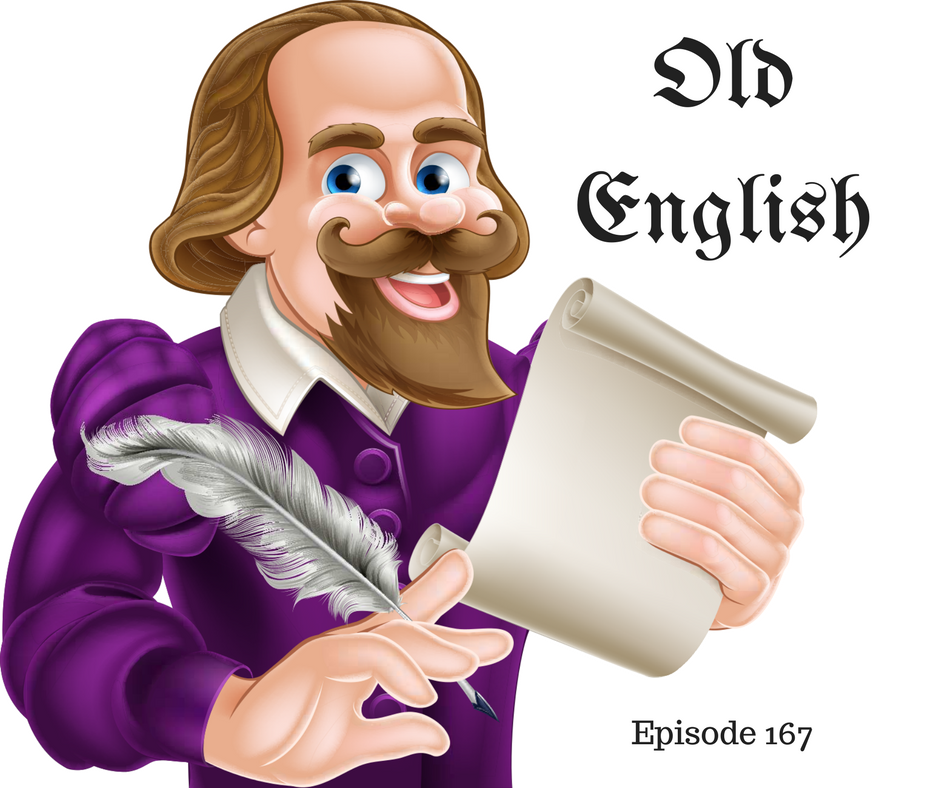
“O Romeo, Romeo, wherefore art thou Romeo?” – What does ‘art’ mean? And what about ‘thou’? We’re talking old English today on this episode of….Aprender Inglés con Reza y Craig.
Comment on the website from our friend, and long-time listener, Marian:
Hi! I´ve just listened to this interesting podcast about the last phrases that famous people said in their last moments ( https://inglespodcast.com//158 ) and really, it is so philosophical to think about what would be your last words before dying. I would like to die around my best friends taking (having/drinking) a cup of coffee thinking that I did the best that I could and that I definitely seized the time. ‘Thanks’ is an excellent word to say, isn´t it?
Having finished my classes, I will have more time to listen to you. Thanks for your time and the possibility of learning English and having your thoughts and memories.
Lots of love, Marian
Voice message from my friend Nestor from Valencia
IRON MAIDEN – “Hallowed Be Thy Name”
https://www.youtube.com/watch?v=71TJitXU8Z0
Words like Thou, Thy, Thine, Ye, Thee etc
Thou = You – When “you” is the subject of the sentence. “O Romeo, Romeo, wherefore art thou Romeo?” (‘Art’ is a form of the word “be” and ‘wherefore’ means “what is the purpose of.”)
“O Romeo, Romeo, what is the purpose of you being Romeo?”
The Lord’s Prayer 
Our Father, which art in heaven, (art = be)
Hallowed be thy Name. (thy = your) (hallowed – sagrado, santificado)
Thy Kingdom come. (Thy is used before a consonant sound ‘K’ or ‘N’ – thy Name)
Thy will be done in earth,
As it is in heaven.
Give us this day our daily bread.
And forgive us our trespasses, (to trespass – entrar ilegalmente, pecar)
As we forgive them that trespass against us.
And lead us not into temptation,
But deliver us from evil.
*(For thine is the kingdom, (thine = your – before a vowel sound)
The power, and the glory,
For ever and ever.)
Amen.
(*Protestants add this part in English)
Thee = You – When “you” is the object of the sentence.
Example: “If thine enemy wrong thee, buy each of his children a drum.” – Chinese proverb
Ye = You (plural) – Plural form of “you” when addressing a group of people.
Christmas Carol
O Come All Ye Faithful
Joyful and triumphant,
O come ye, O come ye to Bethlehem.
Come and behold Him,
Born the King of Angels;
O come, let us adore Him,
O come, let us adore Him,
O come, let us adore Him,
Christ the Lord.
“Ye” is also sometimes used to represent an Early Modern English form of the word “the”, such as in “Ye Olde Shoppe”
Auxiliary verbs in olde English
Wouldst, Couldst, Shouldst, Canst, Hast, Dost, Wilt (Old English, with “Thou”) = Would, Could, Should, Can, Have, Do, Will
“O if thou knewst how thou thyself dost harm, And dost prejudge thy bliss, and spoil my rest; Then wouldst thou melt the ice out of thy breast, And thy relenting heart would kindly warm.”
(From “To Aurora” by William Alexander, 1604.)
Pronunciation of Olde English?
Impossible to say with certainty. Some scholars reckon Shakespeare’s accent might have sounded a bit like a mixture of a modern Yorkshire, (Northern) Irish, Midlands (Birmingham area), South-West England and American accents!
The renowned linguist Sir David Crystal, (who, like Reza, was born in Lisburn, Northern Ireland, but whose accent is nothing like Reza’s), has done very interesting research of his own into the original accent of Shakespearean actors around 400 years ago and tried to reproduce it:
http://www.openculture.com/2013/09/what-shakespeare-sounded-like-to-shakespeare.html
Luke from Luke’s English podcast did a very good interview with Sir David: http://teacherluke.co.uk/ . He’s very down to earth (natural) and easy going (despreocupado)
Thank you for your question Nestor – Nestor’s podcast: Luces Extrañas: http://nestorgm.com/
Words no longer in use
Floppy disc
Tape recorder
VHS (video home system) video, or even older:
Betamax video
Professions that no longer exist: chimney sweep, bell ringer, lamplighter, milkman, switchboard operator, rat catcher, town crier, bowling alley pin setter
Craig tests Reza
¡OJO! Don’t learn these words, they’re not used anymore!
Snoutfair (noun): A person with a handsome face, goodlooking
Jirble (verb): To pour out (a liquid) with an unsteady hand: ‘He jirbled out some whiskey’
Lunting (verb): Walking while smoking a pipe
Famelicose (adj): constantly hungry
Pussyvan (noun): A flurry, temper
Curglaff (noun): The shock you feel when you jump into very cold water
Groak (verb): To silently watch someone while they are eating, hoping to be invited to join them
Englishable (adj): Something that can be changed into English
…and now it’s your turn to practise your English. Do you have a question for us or an idea for a future episode?
Send us a voice message and tell us what you think. https://www.speakpipe.com/inglespodcast
Send us an email with a comment or question to [email protected] or [email protected].
If you would like more detailed show notes, go to https://www.patreon.com/inglespodcast
Our lovely sponsors are:
Nikolay Dimitrov
Ana Cherta
Pedro Martinez
Manuel García Betegón
Maite Palacín Pérez
Lara Arlem
Maria Gervatti
Sara Jarabo
Carlos Garrido
Zara Heath Picazo
Mamen
Juan Leyva Galera
Corey Fineran
Mariel Riedemann
Jorge Jiménez
Raul Lopez
Rafael
Manuel Tarazona
Agus Paolucci
Manuel Velázquez
Néstor García Mañes
Juan Carlos
We want to thank Arminda from Madrid, Alberto from Granada and Angélica Bello from Madrid for continuing to transcribe full transcriptions. Alberto has transcribed episodes 132 and 133, so we now have full transcriptions for episodes 131 to 142, and episodes 1 and 2 thanks to Angélica.
On next week’s episode: Ivan’s True English Story
The music in this podcast is by Pitx. The track is called ‘See You Later’

